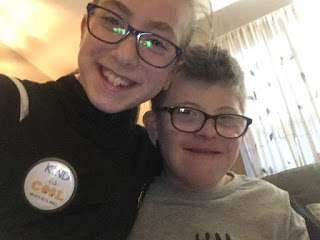In our current culture, we cannot underestimate the importance of being kind. “Kind Is the New Cool” is the motto that my 11-year-old daughter has adopted in her advocacy efforts, and I hear myself constantly reminding all three of my kids that kindness counts.
But for my teenage son with Down syndrome, sometimes kindness just isn’t enough.
Alex is a fortunate kid, in that he has many acquaintances at school and in our community. He receives plenty of high fives in the school hallways, and he hears many enthusiastic “hellos” when he passes a familiar face in the grocery store. He is constantly met with kindness, and for that, we are very grateful.
While we teach our children to be kind, how often are we teaching them to actually be a friend? To invite a peer to hang out after school, or join their “friend group” for ice cream? To respectfully speak to their peers with dignity? Not long ago, we ran into a schoolmate while we were out running errands. This young person cheerfully greeted my daughter, and then also spoke to Alex. With my daughter, she used her typical tone of voice, but with my son, she spoke in a high-pitched tone. She talked to him like he was a two year old, even though he’s actually two years older than her. In the middle of her conversation, he shot me a look that clearly said “Really?!” My daughter was visibly troubled by the exchange, as well. It can be somewhat exasperating for all of us because we know that people have the best intentions, but we do wonder when the realization will hit that Alex is just a kid who wants to be treated like everyone else.
It’s a tricky situation.
Alex enjoys those cheerful greetings and generous high fives, but just like any kid does, he longs for the day when there will be a knock at the front door from one of his friends, asking him to play. He looks forward to the time when he’ll bring home a birthday party invitation. He dreams of having a group of friends that include him because he’s a loyal, fun, genuine kid. As his mother, I spend a lot of time agonizing over how we can help him make these authentic connections, without embarrassing him (he is a teenager, after all!), and without seeming like a creepy, helicopter parent for trying to set up friendships for my teen.
While I continue to chew on that quandary, here’s what parents can do to help families like mine: encourage your kids to not only be kind to everyone, but to also truly include everyone. Help them reach out to kids like Alex, to build true friendships. Teach them to be just as loyal a friend that Alex would be, and urge them to do it because Alex is worthy of having friends, not because it would make a great viral story on social media.
When we can master awareness and kindness, and move beyond those essential elements, we can enjoy true inclusion. How magical that would be!

4 COMMENTS
Like for introverts, true friends for the disabled are far and few in between. However, for me, as a mother of two kids who silently struggle with their disability (possibly without notice from others) your story brought back memories. When entering a school contest we extended an invitation to a child who was more clearly on the spectrum than his school mates. Not only did he stay with the task, but stepped in to work on the project alone when the other two participants' interest in it faded. The combined effort won a prize in the contest and the children's friendship remained strong until they each moved away to separate distant colleges. (now they connect by internet) I am somewhat ahead of you in age, and hind sight is 20/20…I predict that with Alex being young he will likely have the opportunity for more meaningful friendships and interactions. Continue to advocate for your son but don't forget to trust in the magic of the Universe. As your son did not chose this life of difficulty for nothing. He is here to teach, perhaps all of us, some very important lessons. One of my children is now nearly 30, and I sit back in amazement that for years we focused so strongly on his disability to make sure he was educated and so on, but lately it is HE who comes up with the wise answer, and often reaches out to us when we are struggling with certain concepts. I often wonder how much his own struggle contributed to his character development. [Feel free to send me a personal e-mail. We can discuss the "cupcake" situation]. I can so relate.–obviously, your other article.
Thank you for reading!
Yes, there is a big difference between pity and true friendship. I think a lot of people don't realize that you should talk to people with disabilities the same way you talk to anyone else.
I am lucky with my daughter, because she is so outgoing! She participated in a lot of special needs-only activities when she was younger, and she has a lot of friends still (who have various disabilities) from those. We still do a couple special needs activities, but as she gets older, she has been more interested in activities that are not for kids with disabilities. She has learned about starting conversations, in her social skills class, so she will approach other kids frequently! She has made friends at sailing camp, through student council, and at recess. She loves video games and Pokemon, so she has fallen in with the "nerds" in her general education class at school.
Alex sounds like a really likable kid! Maybe help him find activities that suit his interests and coach him on starting conversations. I know it's hard though. There is a lot of misunderstanding about intellectual disabilities.
Bethany
http://happilyloco.wordpress.com
Thank you for reading!